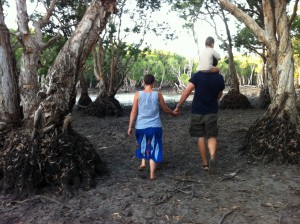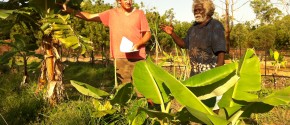Ben Pangas, AHED Facilitator in training, drove right up the middle of the country from Tasmania to Galiwin’ku in 2011 with his family to join the AHED Project team. Ben shares his reflections on the transition.
I am still debriefing my first six months spent in Galiwin’ku, a remote indigenous community off the North East coast of Arnhem Land – and I will be for some time. In a lot of ways it has broken me. It wasn’t the shock of the third world conditions or the comparable poor health and low rates of employment and education. It was realising that in sharing life with this community, I had to lose more than I was prepared for.
I left Tasmania a naïve idealist, up for the challenge of living simply, lightly trained in community development and wanting to make a big difference armed only with untested euphemisms picked up from those who have gone before me: “I’m going to learn and not teach,” “give and not take,” “to empower Yolngu people”.
My role was to live in the community, build relationships and be responsive to any initiatives shown. These initiatives we call enterprises. An enterprise can be a personal goal, a social, political or economical endeavour, and very often are a combination of these. They are the dreams of very courageous and passionate Yolngu people who are working against many complex challenges.
Upon request from these clients, we provide the information they need (where we can, in their own language) to support them to fulfil their dreams. And by dreams I don’t mean a ‘pie in the sky’ idea – but more often than not, we feel we are assisting local Yolngu people to achieve their life purpose. Our hope is to run the Arnhem Human Enterprise Development (AHED) Project in a way that keeps the client at the centre of, and in control of their own enterprise. Put simply, I am an Enterprise Facilitator – in training.
This life-on-life methodology required us to become a part of the community. In doing so, we shared only some of the challenges the locals are facing. The long term housing crisis meant that our housing situation was the same as many other Yolngu people – and that is, there is none available. What felt like significant client time, was quickly sidelined by constant repairs on both the 4WD and trailer (shaken apart by the corrugated roads) and a daily expedition to the local dump to scavenge for whatever building materials we could to build somewhere for us to live and work from.
Our rubbish dump build was impressive despite the challenges of our build needing to withstand white ants, a corrosive coastal breeze and if need be, a cyclone. Adding to that, our building site is a sand dune, with no shade and no power during the day. It felt like madness working away in the tropical heat trying to build something out of nothing. If we had any other options we would have taken them. This simple life was so hard. Living in a tent with a two year old has taught me that. There was not one area of life on the island that was not stressful. These stresses of just living and operating in a hot, remote, oppressed, expensive, yet under resourced and highly politicised environment taunted our ability to cope. I was drawn to this radical and important work as many are – but the reality, however, was something different altogether.
What betrayed me was not my willingness nor passion, but my power. Galiwin’ku stripped me of the expectation of being in control, being able to be efficient and having all the choices I have come to rely on in order to control my environment .
As a dominant culture person, we can feel an entitlement to be able to be helpful and effective, and to be able to make things happen. Even with an ambition to meet the needs of others, we tend to take up space just by our need to be relevant. There was no room for this here. There are too many others without the room to achieve their goals to have another Balanda (white man) wanting to make a ‘big difference’.
The times I entered Yolngu cultural spaces, where they were in control and they knew how things worked, I became the ‘outsider.’ The one without knowledge of how things worked, feeling awkward around cultural and social norms, and left without the ability to communicate effectively. As I arduously place myself in these situations where I felt disempowered, it was the same space where Yolngu were more empowered. The irony was that the more uncomfortable I became, the more my desire to empower Yolngu people was realised. In giving up your own power another person can become empowered.
In Galiwin’ku, powerlessness is not something the dominant culture values. It is not long after arriving here you begin to sense that something is not quite right. It gives the impression of being a vibrant and hard-working town, bustling with activity. However, with low rates of employment and education, it is not the locals that are busy. It is the Balanda that run things here whilst Yolngu are left to look on, or at best play the assistant or receptionist.
In a community like Galiwin’ku, dominant culture people hold power, simply because of their ability to understand and operate within the dominant culture. This power, in the interest of making a difference, unsurprisingly, places them into positions of influence and authority – which in the end, perpetuates the loss of control that Yolngu are experiencing. As a ‘powerful’ culture we must intentionally become less to prevent taking the space that is intended for others to grow into.
We, the people of the dominant culture, have a vague understanding that we need the Aboriginal Australians and their worldview, that we have something to learn from them and that our world will be poorer without them – and yet we seem incapable of safe guarding and accessing that. Maybe, what we have to learn from our Indigenous peoples, is that if you hold onto your power and have too much power, then you will use, misuse and abuse it.
If we can learn to embrace some powerlessness and let go of some control, and for the Yolngu people, if in gaining some control they become less powerless, then hopefully we will both arrive at a place where we can learn something from each other.
“If you have come to help me you are wasting your time. But if you have come because your liberation is bound up with mine, then let us work together”.
-Lilla Watson and a group of Aboriginal activists in Queensland, 1970.




Anna Dowd •
Thanks so much Ben- really inspiring- your committment to such a process. I think the work of AHED and other individuals striving to work with these methodologies is showing a way forward that is true innovation and deep reconciliation. It’s history making stuff. I really hope you continue to document and share with others your journey. Thanks again.
Wendy Scarlett •
I landed on this post because I’m off to the Bridging the Gap training tomorrow and the page linked me over. I found it really interesting to read how you’re aspirations and understanding have been impacted by living in a remote Yolngu community. I’m also from Tasmania, but arrived on Elcho after several years in Numbulwar so my own taken-for-granted assumptions and world view had already been shaken and challenged. In Numbulwar there were only about 30 non-indingeous workers so the sense of being a minority, albeit part of the “dominant” culture was much stronger there. I feel extraordinarily privileged to have the opportunity to learn from Yolngu, and I am humbled by their generosity in sharing. Delighted to discover comments from Balanda mialk Sally and Naomi whose experiences at Galiwin’ku overlapped with some of my family’s time there.
Sally Herweynen •
So good to hear about your journey Ben! I love all those reflections on what happens when we let go of power and control in situations.With similar euphemisms and also leaving Tasmania(with a very different indigenous heritage), i hear so much of what you are saying as an echo to our years in Elcho.Been following AHED for a little while now and am so excited about the possiblities for Yolngu empowerment through your ideals. So validated in my hopes and dreams for Yolngu by what you are all aiming for. Also very excited about your newest addition to the team – Ben Grygoruk!
Naomi Havens •
Ben, you really get it. A journey toward another person is also a journey deeper within ourselves. Knowledge is power – it puts us where we are, but it can also move us from that place. Keep on making yourself vulnerable to the knowledge of another’s experiences – and keep writing about it please!!!